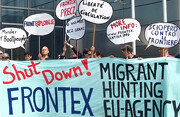Between 4 million and 8 million people reside illegally in Europe, which has made illegal migration a top priority in European politics for the past few years. Illegal migrants come mainly to the Mediterranean countries from Africa, Eastern Europe, and the Middle East. Most of them also choose to stay permanently. Low fertility rates and aging populations coupled with a higher level of education have led to labor shortages in low-paying sectors. In Southern Europe, the informal economy provides work for the paperless within these areas, something that politicians are unwilling to admit to the public.
Xenophobic and hostile attitudes toward immigrants make politicians play on people's fears to get re-elected rather than focus on constructive solutions to the problem. Instead of acknowledging and controlling the structural demand for cheap foreign labor, governments have addressed it as a security matter, with a concentration on border control and restrictive policies for asylum and work permits. This, in turn, has led to a lack of rights for illegal migrants and has enabled employers to exploit their labor.
Over the past 20 years, Spain and Italy have received the most immigrants of all European countries and together with Greece they host a large number of foreign illegal residents. These countries are traditionally countries of emigration and they didn't start receiving immigrants until the early 1980s. Therefore they have less experience of immigration than other European countries. Initially the situation was met with a total absence of laws regulating residence and work matters, which helps explain the emergency-like approach to immigration that has influenced policy-making and legislation over the past two decades.
In 2004, the European Union set up the Frontex border agency, which helps member countries patrol the Mediterranean Sea in order to obstruct would-be boat migrants from reaching the European coast. But Frontex and the focus on external border control have not stopped the flow of people. Overstaying a visa is the most common form of becoming illegal, followed by the very profitable business of human trafficking.
Greece reported that more than 15,000 illegal immigrants arrived last year, mainly from Turkey. The immigration flow into Italy boomed after 2001, with thousands of people arriving every year. Italy's Prime Minister Silvio Berlusconi won the election in 2008 on his promises of strengthened measures against illegal immigration. The newly adopted legislation, the so-called Security Package, makes it a crime to enter the country, punishable with fines and up to four years of imprisonment. Even housing someone without papers is now a crime, risking up to three years in prison for the person providing shelter.
Still, in 2008, nearly 37,000 illegal immigrants landed on Italian coasts, a 75 percent rise from the previous year. More than 18,000 boat migrants were arrested when trying to enter Spain in 2007, but about 350,000 illegal immigrants are already residing in the country, despite the fact that there have been several previous amnesties. The European Union research project on illegal migration, Undocumented Worker Transitions (UWT), found in its report that "the adoption of restrictive immigration policies together with criminalization of migration has been accompanied by a surge in the numbers of undocumented migrants."
Italian sociologist Emilio Reyneri's research on labor and immigration, shows that the informal economy in Southern Europe has a pull-effect on migration. The informal economy has deep social and historical roots and has not been caused by immigration. The opportunities for informal work, strengthened by the fact that there are labor shortages in sectors where natives no longer want to work, has made these countries attractive for migrants. In Greece, the many small family businesses provide a suitable environment for informal economic activity, which constitutes around one-third of the country's GDP. On the Spanish coasts, hiring undocumented workers for agricultural work has been a generalized practice for several decades—those workers being the only labor available to this sector.
The informal economy in Italy is very complex, involving both self- and wage-employment in the household, construction, service, and manufacturing sectors. Many Italians young and old work informally, and it is socially accepted to do so. Although the government has taken some measures in recent years, the informal economy is widespread, and has become a part of the everyday culture of Italians. In the south, at least 25 percent of all economic activities are informal, mostly within agricultural work. However, it is the construction sector in the central and northern parts of Italy that is employing the highest numbers of illegal migrants. Many small businesses are hiring these people on a daily basis, making it difficult for authorities and unions to control it.
The UWT report implies that the economic crisis will further encourage the growth of the informal economy, though recent news reports a decrease in illegal migration for the moment. This suggests that, due to the recession, natives may be more willing to accept low-paying jobs, leaving immigrants out of work. As the global economy turns around, illegal immigration will likely reemerge and continue to be the source of marginalized and cheap labor.
As a long as large economic inequality persists, people will have an incentive to migrate for the opportunity of a better life. In combination with the demand for cheap labor in Europe, border control can never stop illegal immigration. The choice of the Italian political right to criminalize immigration will only further marginalize a group of people that are already living without rights. Furthermore, it may indirectly force them to turn to criminal gangs, such as the mafia. As European unemployment rises, anti-immigration rhetoric grows stronger. Continuing to deny immigrants a role in the economy risks creating a permanent underclass.
In the meantime, thousands of people are waiting along the shores of Africa, risking their lives to enter Europe for a better life. The great irony is that thousands of employers are waiting for them.
Sofia Karlsson is a Carnegie New Leader and a student at Lund University, Sweden.




